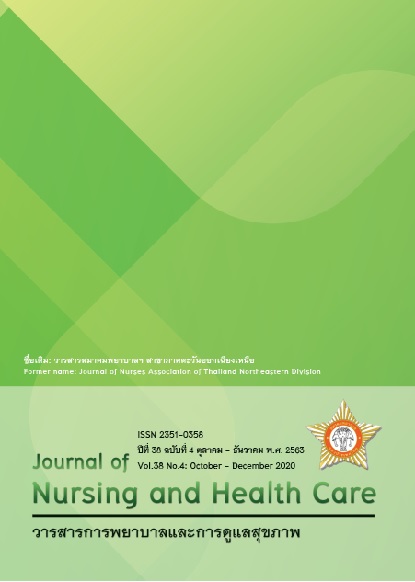รูปแบบการจัดเครือข่ายบริการพยาบาลรายกรณีสำหรับผู้ป่วยระยะสุดท้าย ศูนย์กรุณาพีร์ คำทอน โรงพยาบาลร้อยเอ็ด
คำสำคัญ:
รูปแบบการจัดเครือข่ายบริการ, พยาบาลรายกรณี, ผู้ป่วยระยะสุดท้าย, ศูนย์กรุณาพีร์ คำทอนบทคัดย่อ
วิจัยเชิงปฏิบัติการแบบมีส่วนร่วมนี้มีวัตถุประสงค์เพื่อพัฒนาและประเมินผลลัพธ์รูปแบบการจัดเครือข่ายบริการพยาบาลรายกรณีสำหรับผู้ป่วยระยะสุดท้าย ศูนย์กรุณาพีร์ คำทอน โรงพยาบาลร้อยเอ็ด กลุ่มตัวอย่าง แบ่งเป็น 2 กลุ่ม ได้แก่ 1) พยาบาลวิชาชีพที่ปฏิบัติงานในศูนย์การดูแลระยะสุดท้ายของโรงพยาบาลศูนย์และโรงพยาบาลชุมชนทุกแห่งในจังหวัด ร้อยเอ็ด จำนวน 26 คน 2) ผู้ป่วยระยะสุดท้ายที่เข้ารับการรักษาใน ศูนย์กรุณาพีร์ คำทอน จำนวน 86 คน ขั้นตอนวิจัย มี 4 ระยะ คือ วิเคราะห์สถานการณ์การจัดบริการพยาบาลผู้ป่วยระยะสุดท้าย พัฒนารูปแบบฯ ทดลองและปรับปรุงรูปแบบฯ และประเมินผลลัพธ์ เก็บข้อมูลโดยการสังเกต สัมภาษณ์เชิงลึก สนทนากลุ่ม สอบถาม ระดมสมองและสะท้อนคิด เครื่องมือ เก็บรวบรวมข้อมูล ได้แก่ แบบสอบถาม แบบสัมภาษณ์ และแนวทางสนทนากลุ่ม ระยะเวลาศึกษา 1 มิถุนายน พ.ศ. 2559 ถึง 31 กรกฎาคม พ.ศ. 2562 วิเคราะห์ข้อมูลเชิงปริมาณโดยการแจกแจงความถี่และร้อยละ วิเคราะห์ข้อมูลเชิงคุณภาพโดยการวิเคราะห์เนื้อหา
ผลการวิจัย: การวิเคราะห์สถานการณ์การจัดบริการพยาบาลผู้ป่วยระยะสุดท้าย พบว่า การบริการมีรูปแบบบริการที่หลากหลายส่งผลทำให้ผู้ป่วยระยะสุดท้ายและครอบครัวได้รับการดูแลที่แตกต่างกัน บุคลากรพยาบาลและทีมสหสาขาขาดความรู้ ทักษะ และทัศนคติที่ดีในการดูแลผู้ป่วย ขาดงบประมาณสนับสนุนขาดอุปกรณ์ที่จำเป็นสำหรับนำไปใช้ในการดูแลผู้ป่วยระยะสุดท้ายที่บ้าน ส่วนด้านผู้ป่วยพบปัญหาว่าผู้ป่วยและญาติบางครอบครัวมีฐานะยากจน และบางครอบครัวไม่สามารถนำผู้ป่วยกลับบ้านได้เองด้วยความเชื่อวัฒนธรรมไม่ให้นำศพเข้าบำเพ็ญกุศลที่บ้าน ญาติจึงจำเป็นต้องเช่ารถเอกชน
โรงพยาบาลร้อยเอ็ดที่พัฒนาขึ้น ประกอบด้วย 3 องค์ประกอบ ได้แก่ 1) แนวคิดในการกำหนดประเด็นปัญหาเนื้อหาการดูแล
ผู้ป่วยระยะสุดท้ายจากโรงพยาบาลสู่ชุมชน 6 ด้าน 2) การจัดการระบบบริการพยาบาลแบบประคับประคองผู้ป่วยในระยะ
สุดท้าย 3) กระบวนการดำเนินงานของเครือข่ายบริการพยาบาลรายกรณีสำหรับผู้ป่วยระยะสุดท้าย ผลลัพธ์ของรูปแบบ
ที่พัฒนา พบว่า พยาบาลผู้จัดการรายกรณีเครือข่ายมีความรู้ ทักษะ และทัศนคติที่ดีเกี่ยวกับการดูแลผู้ป่วยระยะสุดท้ายและ
มีสมรรถนะผ่านเกณฑ์ร้อยละ 80 ทุกแห่ง ผู้ป่วยเข้าถึงบริการดูแลในระยะสุดท้ายเพิ่มขึ้น มีการใช้ Opioid จัดการอาการปวด
และบรรเทาความทกุ ข์ทรมานของผ้ปู ่วยเพิ่มขึน้ ผ้ปู ว่ ยมีอาการปวดลดลงจากระดับรนุ แรงมาอย่ใู นระดับปานกลาง ผ้ปู ว่ ยและ
ญาติมีเครียดและความกังวลใจลดลง ได้รับการดูแลต่อเนื่องที่บ้านเพิ่มขึ้น ความพึงพอใจของญาติผู้ดูแลโดยรวมอยู่ในระดับ
มาก ประเมินรูปแบบและระดับการยอมรับของพยาบาลผู้ใช้รูปแบบการพัฒนาฯ พบว่า โดยรวมอยู่ในระดับมาก
สรุป: การพัฒนารูปแบบการจัดเครือข่ายบริการพยาบาลรายกรณีสำหรับผู้ป่วยระยะสุดท้าย โรงพยาบาลร้อยเอ็ดโดย
การมีส่วนร่วมของสหวิชาชีพ ส่งผลให้บริการมีประสิทธิภาพมากขึ้น ผู้ป่วยและผู้ดูแลพึงพอใจสูง จึงควรนำรูปแบบที่พัฒนา
ขึ้นไปใช้ในการดูแลผู้ป่วยอย่างต่อเนื่อง และมีการติดตามประเมินผลอย่างสม่ำเสมอ
Downloads
เอกสารอ้างอิง
1. World health organization. WHO definition of Palliative care. In: National cancer Control Programs: Policies and managerial guideline. 2nd Ed. WHO Geneva: 2002. : 83-91.
2. World Health Organization. Definition of palliative care. Geneva, Switzerland: WHO. 2005.
3. Nantachaipan, P.. Paliative Care End of Life Care Case Management Case Managet. Nursing Journal, 2015, 42(1);153-158.
4. National Health Commission Office (NHCO). National Health Act, B.E. 2007, Section 12, first paragraph. https://www.nationalhealth.or.th/node/429; 16 February, 2015.
5. Srirattanaball, J. et al. Synthetic Research Project for Hospice Care System Development in Thailand, Part 1: Hospice Care Situation in Thailand, Research Center for Health Service Development (TRC- HS) Faculty of Medicine Chulalongkorn University Academic Service Center of Chulalongkorn University Supported by the Health System Research Institute (HSR). http://kb.hsri.or.th/dspace/handle/11228/4924.2561.
6. Charoenkajorn, S. Picture of the situation of Hospice Care in Thailand. https://peacefuldeath.co/thailandhospicesituation/.
7. Nursing office Office of the Permanent Secretary Ministry of Public Health. Palliative nursing service system. Print at the company Tawan Media Publishing Co., Ltd. 2016.
8. Henry K. Beecher, Ethics and Clinical Research, New England Journal or Medicine 274 (1966): 1354-60.
9. Phairojkul, S.W. Improving the well-being at the end of the life of the Thai people in: Dusit Sathaworn, Editor. Who care We Do. Bangkok, Beyond Enterprise Co., Ltd.; 2014. 1-9.
10. Phosri, T. Palliative care for terminally ill patients: from hospital to home. [List of independent studies, Master of Nursing Science], Khon Kaen: Khon Kaen University; 2007.
11. Watthanawat, T. Factors Correlating with Spiritual Needs of Patients with End-stage Cancer. [Master's thesis in Nursing], Bangkok: Chulalongkorn University; 2008.
12. Kusirilerttrakul, S. Suwalak Wongchunlungsilp, Praphai Ariyaprayoon and Manachirajarat. Cancer Nursing. Samut Prakan: Sinthavee Printing Co., Ltd.; 2012.
13. Piyawattanaphong, S. Palliative care development for patients with terminal cancer in a tertiary hospital. [Doctor of Philosophy thesis]. Khon Kaen: Khon Kaen University; 2009.
14. Thaprasit, T. Pimonrat Pimdee, Sasipin Thamongkolchai, Puangphayom Microorganism Putthatham. Development of a Palliative Care Model in the Terminals of Udon Thani Hospital. Journal of Nursing, Ministry of Public Health. 2013; 23 (1): 80-90.
15. Naruenat, W.S., Thanierat, A., & Wisettharn, T. Development of a Palliative Care Model for Cancer Patients Maharaj Nakorn Si Thammarat Hospital. Journal of Ministry of Public Health. 2015; 25 (1), 144-156.
16. Thep Suriyanon, S., & Mayuret, W. Development of a palliative care system for patients with terminal cancer. In Sanphasitthiprasong Hospital Ubon Rachani. Journal of the Association of Nursing Northeastern Region. 2013; 31 (1), 24-33.
17. Prasert, S., Chuamthong, T. & Sripalawong, S. Development of a supportive service system for the nursing group. Chonburi Hospital Journal of Clinical Medicine Education Center Rapokklao Hospital. 2016; 33 (4), 326-339.
18. Pridi, P. Development of a model of palliative care for patients with terminal cancer, Kham Muang Hospital, Kalasin Province. Journal of Health System Research and Development, 2013, 6 (2): 114-119.
19. Pleumjai, T. Management Model for Nursing Service Quality Developing of Palliative Care in Songkhla Hospital. Journal of Prachomklao College of Nursing, Phetchaburi Province, 2020, 3(1); 73-94.



